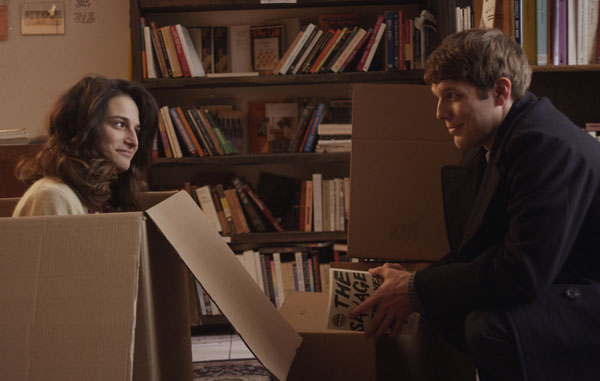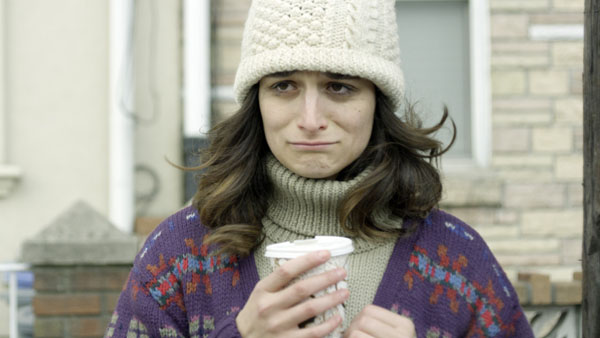The Dissolve‘s Nathan Rabin “was thoroughly charmed by Obvious Child, a wonderful vehicle for Jenny Slate, a comedian and actor who was briefly a cast member on Saturday Night Live before taking on scene-stealing roles on Parks and Recreation and Kroll Show.”
“Donna Stern (Jenny Slate) is a self-flagellating stand-up comic, an empress of oversharing,” writes the Guardian‘s Xan Brooks. “She jokes about the stains on her pants and her flatulent arse; about her boyfriends and her Jewishness. When Donna books herself in for a Valentine’s day abortion, it’s inevitable that she will jump up on the stage and crack jokes about that too.”
“What, what?” interrupts the Boston Globe‘s Ty Burr. “Where pretty much every American movie in which a heroine gets knocked up—including Knocked Up—is terrified of mentioning the A word, let alone following through with it, Obvious Child plows ahead with sympathy, sisterhood (thanks to the great Gaby Hoffman as Slate’s no-nonsense roommate), and, most shocking of all, cauterizing humor…. [A]ny movie that casts Richard Kind and Polly Draper as the heroine’s parents is doing something right, and Slate understands that when her character tells a shamelessly funny fart joke, that’s just the way she cries.”
Flavorwire‘s Jason Bailey agrees that “it’s the picture’s clear-eyed view of casual sex and accidental pregnancy that makes it memorable—and, in its own quiet way, kind of revolutionary.”
“But breaking taboos is easy; the question is what you make out of the pieces you’re left with.” James Rocchi at the Playlist: “There’s none of the expected movie-of-the-week scenes here—Slate never has an actorly monologue about her predicament, just a series of laugh-so-you-don’t-cry wisecracks; when she goes to the clinic, she’s never confronted by shrieking anti-abortion activists. And yet when Donna is laying sedated on an operating table and gravity sends her tears down her cheeks towards the clinical cold tile floor, you can recognize that her decision may be decisive, but it isn’t unfelt.”
“In the space of a week Donna is dumped by her boyfriend, loses her job, and hits a new low on stage as a struggling NYC comedian,” notes Michael Cusumano at the Film Experience. “The film may never reaches the heights of, say, Frances Ha’s take on similar material, but it unfolds with a directness and honesty that keeps the grinding of plot gears from becoming too audible.”
“Certainly, much of Donna’s appeal owes to Slate’s ability to ad-lib, though her dramatic range comes as a nice surprise,” finds Variety‘s Peter Debruge. “The entire situation puts her through some understandably wild emotional swings, and Slate proves more than equipped for the ride.”
“In other hands, the film’s second half could have become too serious, sentimental or agenda-charged,” adds the Hollywood Reporter‘s Todd McCarthy, “but [writer-director Gillian] Robespierre always keeps authentic emotion and brainy humor in the forefront.”
“So hats off to Robespierre and Slate,” writes Beth Hanna at Thompson on Hollywood. “They’ve managed to deliver a film with actual edge, which somehow retains the characteristics that any successful romantic comedy should have: It’s heartwarming, romantic and very funny (and, significantly, at no point do they downplay the emotional ramifications an abortion can have on a woman). This is the type of crowd-pleaser we could use more of.”
At the same time, Kim Voynar, writing for Movie City News, warns that “if fart jokes and sex jokes, abundant cursing, peeing in public and pooping in front of your best friend while awaiting the results of a pregnancy test are things that you can’t handle, this might not be the film for you. If you can get past those things to the core of this film, though, you might just find the places where Robespierre’s story resonates for you, too. It certainly did for me.”
At Filmmaker, Dan Schoenbrun has five questions for Robespierre, Danielle Lurie talks with Robespierre, Slate and producer Elizabeth Holm and Scott Macaulay interviews D.P. Chris Teague. And at Indiewire, Peter Knegt reports that A24 has picked up North American rights. International rights have gone to The Exchange, reports Variety‘s Dave McNary.
For news and tips throughout the day every day, follow @KeyframeDaily on Twitter and/or the RSS feed. Get Keyframe Daily in your inbox by signing in at fandor.com/daily.





